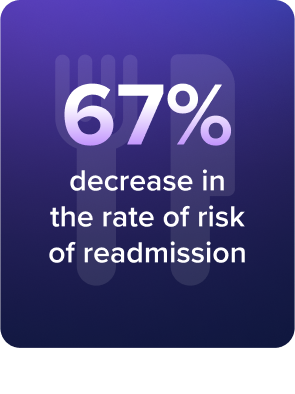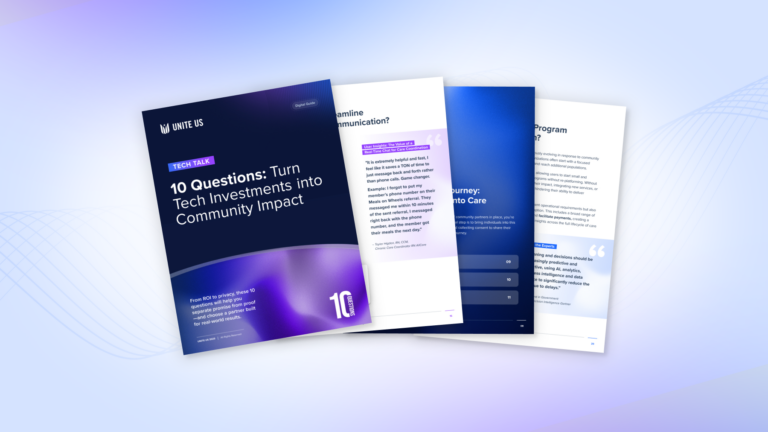
Food is Medicine: How NCDHHS, Meals on Wheels, a Major Academic Medical Center, and Unite Us Collaborated to Reduce Hospital Readmissions for Older Adults
Through a partnership between NCDHHS, Meals on Wheels of North Carolina, a major Academic Medical Center, and Unite Us, this program provided nutritious meals to food-insecure older adults after hospital discharge—reducing readmissions and promoting recovery. This case study explores how the program worked, what made it successful, and the lessons learned to help other states replicate and scale similar initiatives.
Background

In 2021, the North Carolina Department of Health and Human Services (NCDHHS) Division of Aging received state funding through the American Rescue Plan Act (ARPA) to strengthen special nutrition services for older adults. As part of this effort, the Division partnered with Meals on Wheels of North Carolina and Unite Us to launch a pilot program that provided two weeks of meals to food-insecure patients aged 60 and older after hospital discharge. The program aims to support recovery and help reduce hospital readmissions through access to nutritious meals.

“This program, our hospital discharge meals pilot program, is just that—it’s a pilot to try to evaluate the effectiveness of providing healthy meals to high-risk older adults who, we define as age 60 years or older, after hospital discharge with the hopes of reducing health complications and reducing hospital readmissions through proper nutrition. By high risk we mean older adults who, during a hospitalization, were found to either have malnutrition, or be at risk of malnutrition, or be experiencing food insecurity.”
Julie Sundermann, MPH, RD, Nutrition Program Consultant, Division of Aging, NC DHHS
Challenge
 Launching North Carolina’s “Food is Medicine” pilot was a collaborative effort, building upon the previous partnership among NCCARE360, NCDHHS, and Meals on Wheels of North Carolina.
Launching North Carolina’s “Food is Medicine” pilot was a collaborative effort, building upon the previous partnership among NCCARE360, NCDHHS, and Meals on Wheels of North Carolina.
Designing the program included defining the patient population (60+, recently discharged home from the hospital, with concern for food insecurity or malnutrition) and determining the intervention timeframe (e.g., two weeks of meals). Providers made referrals for services using the NCCARE360 network, powered by Unite Us’ platform, which enabled them to collect structured information on who was referred and who received meals.
The aim was to create a seamless pathway: a patient identified at discharge could be referred through NCCARE360, matched with a local Meals on Wheels provider, and quickly receive home-delivered meals.
Duke Health was in a unique position to use this program because it had integrated NCCARE360 directly into its electronic health record (EHR) system in 2021 and implemented systematic screening for social drivers of health.
In addition, the health system spearheaded initiatives around improving transitions of care after discharge and addressing health related social needs. This created an environment where communication about the Meals on Wheels Hospital Discharge Program could be incorporated into workflows across the health system. Program evaluation was possible because Duke Health’s integration captured structured data in both NCCARE360 and the EHR, enabling tracking of referrals, services delivered, and patient outcomes.

“This innovative partnership between Duke Health, Meals on Wheels North Carolina, NCDHHS, and the Unite Us-powered NC CARES 360 platform ensures that older adults leaving the hospital receive two weeks of nutritious meals delivered to their homes. Together, we are helping reduce readmissions, improve recovery outcomes, and strengthen the support system for North Carolinians when they need it most.”
Kimberly Strong, Executive Director, Cabarrus Meals on Wheels
Solution
The NCDHHS Division of Aging contracted with Unite Us, the state’s technology partner for NCCARE360, to facilitate the pilot process. The process for a patient referral worked as follows:
- Identification: The health system’s team members screened patients and identified those meeting the eligibility criteria.
- Referral: Referrals were entered into the Unite Us platform.
- Central Coordination: The state-level Meals on Wheels of North Carolina received and processed these referrals, verifying eligibility as the contracted implementer for NCDHHS.
- Local Dispatch: The referrals were then directed to the appropriate local Meals on Wheels affiliate for service delivery.
- Delivery: Local Meals on Wheels volunteers or staff delivered meals to the patients’ homes.
- Outcomes Tracking: Members of the patient’s care team could view in the Unite Us platform whether the patient received the meals.
 Impact
Impact
The leading referral partner in the pilot, Duke Health, referred more than 400 patients to the program between September 2022 and April 2024. Researchers there conducted an evaluation of the program and found a significant reduction in unplanned hospital readmissions at 14 days among patients who received the two weeks of home-delivered meals.

“You can see here that the referral for meals led to about a 67% decrease in the rate of risk of readmission if the patients got meals versus the patients who did not get meals. This is statistically significant. For patients who got the meals, their odds of being readmitted was one-third of those who did not get meals.”
Eugenia McPeek Hinz, MD, MS, Duke Health

Lessons Learned
- Food is Medicine: This pilot program supports the vital role of “food is medicine” interventions. The collaboration between NCDHHS, Meals on Wheels of North Carolina, NCCARE360, and participating hospitals, underscores the critical importance of public-private partnerships in improving health outcomes across the state.
- Community-Based Nutrition Support Improves Health Outcomes for Older Adults: Meals on Wheels (MOW) programs have a long-standing history–spanning decades–of successfully addressing malnutrition and food insecurity among older adults at the community level. Their person-centered, adaptable, and time-tested meal-delivery models make MOW programs ideal partners for healthcare entities seeking to connect vulnerable patients with crucial community support after hospital discharge. The additional funding stream enabled Meals on Wheels of North Carolina and their local affiliates to significantly expand their mission, providing critical support to at-risk patients immediately after hospital discharge.
- Scalable Infrastructure Streamlines Cross-Sector Coordination: This initiative showcases how government agencies, like the NC Department of Health and Human Services Division of Aging, can effectively collaborate with healthcare entities and community-based organizations (CBOs). Partnerships enable the effective scaling of health-related social needs interventions with fewer operational barriers. NCCARE360 provides the digital infrastructure for streamlined statewide referrals, facilitating coordination between healthcare entities like Duke Health and essential services such as Meals on Wheels home-delivery meal programs.
- Technology is Key for Seamless Collaboration: The strategic use of technology was a key component of the pilot’s success. The seamless integration of the NCCARE360 network into participating hospitals’ EHR streamlined care coordination and reduced administrative friction. This shared community infrastructure made it easier to connect patients to vital community resources and allowed for greater efficiency in linking them to food resources from any county in North Carolina. This coordinated approach contributed to the notable reduction in hospital readmissions, demonstrating the power of a connected system.
 Turning Research Into Action: The evaluation conducted by researchers demonstrates the effectiveness of the NCDHHS pilot program in addressing food insecurity in at-risk older adults facing malnutrition and/or food insecurity. The evaluation showed a decreased likelihood of readmission at 14 days for those who received meals. The research adds to the growing body of evidence supporting “food is medicine” initiatives and offers actionable insights to inform future policy development and investment considerations in public health.
Turning Research Into Action: The evaluation conducted by researchers demonstrates the effectiveness of the NCDHHS pilot program in addressing food insecurity in at-risk older adults facing malnutrition and/or food insecurity. The evaluation showed a decreased likelihood of readmission at 14 days for those who received meals. The research adds to the growing body of evidence supporting “food is medicine” initiatives and offers actionable insights to inform future policy development and investment considerations in public health.
About Unite Us
Unite Us is the nation’s leading software company bringing sectors together to improve the health and well-being of communities. We drive the collaboration to identify, deliver, and pay for services that impact whole-person health. Through Unite Us’ national network and software, community-based organizations, government agencies, and healthcare organizations are all connected to better collaborate to meet the needs of the individuals in their communities.






